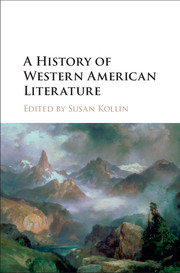Book contents
- Frontmatter
- Contents
- Notes on Contributors
- Acknowledgments
- Introduction: Historicizing the American Literary West
- PART I HOMELANDS
- PART II MAKING A REGION
- PART III GEOGRAPHIES OF THE LITERARY WEST
- 8 Literature of the Great Plains: Nature, Culture, and Community
- 9 Southwest Literary Borderlands
- 10 Imagining the Rocky Mountain Region
- 11 Writing the Pacific Northwest
- 12 The Far North: Literatures of Alaska and Canada
- 13 The Problem of the Critical in Global Wests
- PART IV THE TWENTIETH CENTURY AND BEYOND: LITERARY MOVEMENTS AND CRITICAL PERSPECTIVES
- Selected Bibliography
- Index
13 - The Problem of the Critical in Global Wests
from PART III - GEOGRAPHIES OF THE LITERARY WEST
Published online by Cambridge University Press: 05 November 2015
- Frontmatter
- Contents
- Notes on Contributors
- Acknowledgments
- Introduction: Historicizing the American Literary West
- PART I HOMELANDS
- PART II MAKING A REGION
- PART III GEOGRAPHIES OF THE LITERARY WEST
- 8 Literature of the Great Plains: Nature, Culture, and Community
- 9 Southwest Literary Borderlands
- 10 Imagining the Rocky Mountain Region
- 11 Writing the Pacific Northwest
- 12 The Far North: Literatures of Alaska and Canada
- 13 The Problem of the Critical in Global Wests
- PART IV THE TWENTIETH CENTURY AND BEYOND: LITERARY MOVEMENTS AND CRITICAL PERSPECTIVES
- Selected Bibliography
- Index
Summary
From James Fenimore Cooper's frontier novels to Gloria Anzaldúa's Borderlands/La Frontera (1987), so much of western American literature involves fraught borders and global contest. The ascendance of transnational paradigms in Americanist literary studies over the last two decades has fueled remappings of the literary West, calling attention to a thematics of colonial/national spillover and border travel, and claiming on behalf of them a critical perspective that opens the regional West, beyond its Turnerian limits, to the world. The work of Neil Campbell is exemplary in this regard, conceiving “westness as part of a larger system of discourse beyond the national imaginary, pointing in many directions at once.” But before transnational critique overhauled interpretive priorities and literary politics, what critics used to call classic popular and literary texts also showed strong inclinations toward a thematics of movement, of fluidities of borders, and a profound interest in the global – as examples, again Cooper, through dime novels, to Owen Wister's The Virginian (1902), Willa Cather, Mary Austin, Stephen Crane, Zane Gray, A. B. Guthrie's The Way West (1950), Edna Ferber, and Wallace Stegner.
The point is that one need not go, for a sense of the global or border crossing, to writers of the contemporary period whose literary works mix and interrogate the cultural geographies of the U.S. West, Asia, Canada, the Caribbean, Mexico, Brazil, Argentina, or Indian Country. For a sense of the global, one could as easily go to case studies in American exceptionalism overlaid onto settler colonial travel, like the one offered in The Way West, or like Stegner's claim for the West as a geography of hope, the landscape against which national character was forged. Suggesting this is not to argue that classics carry out unambivalently their settler/border dwellings. Stegner's Wolf Willow (1962) is a journey of memory, history, fiction, and memoir, which chronicles a boyhood spent, in part, on the contested plains of the Saskatchewan/Montana region.
- Type
- Chapter
- Information
- A History of Western American Literature , pp. 205 - 222Publisher: Cambridge University PressPrint publication year: 2015
- 1
- Cited by

